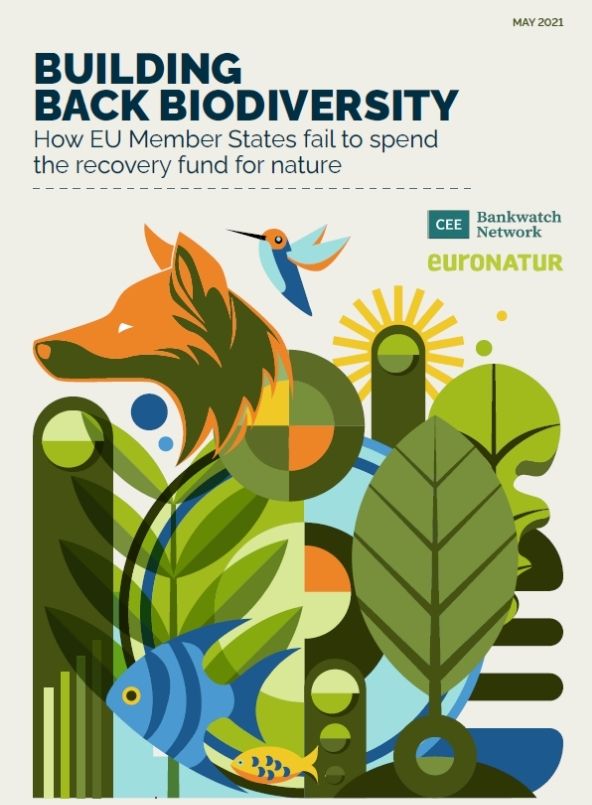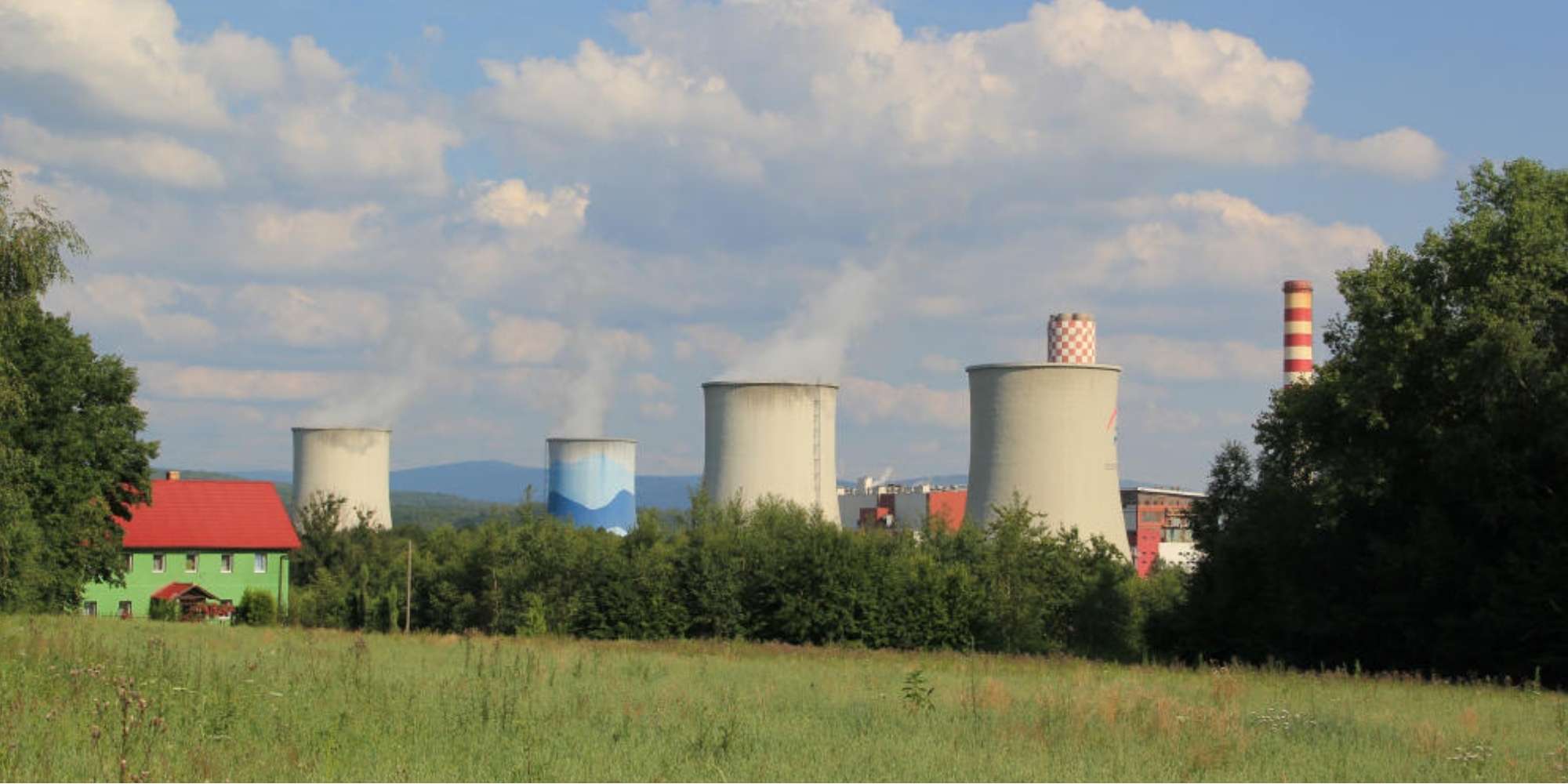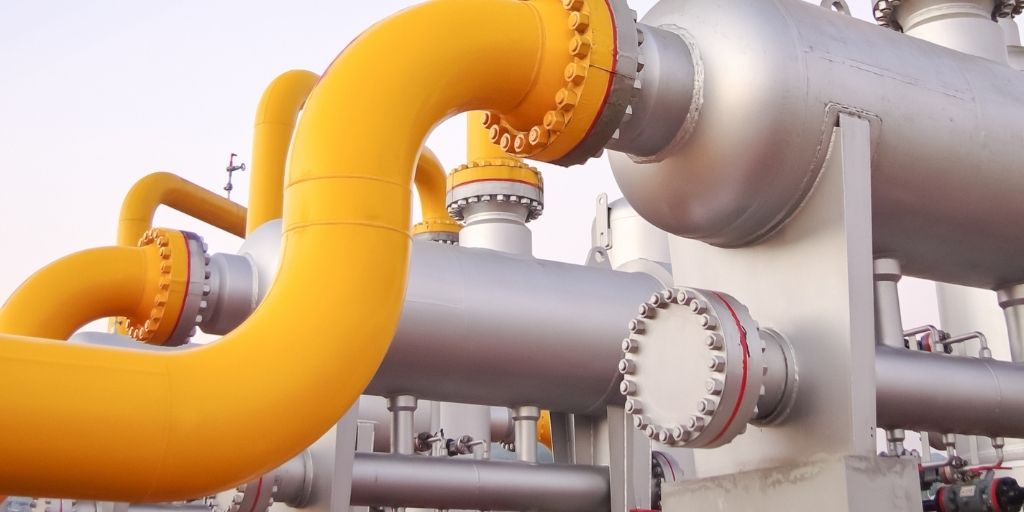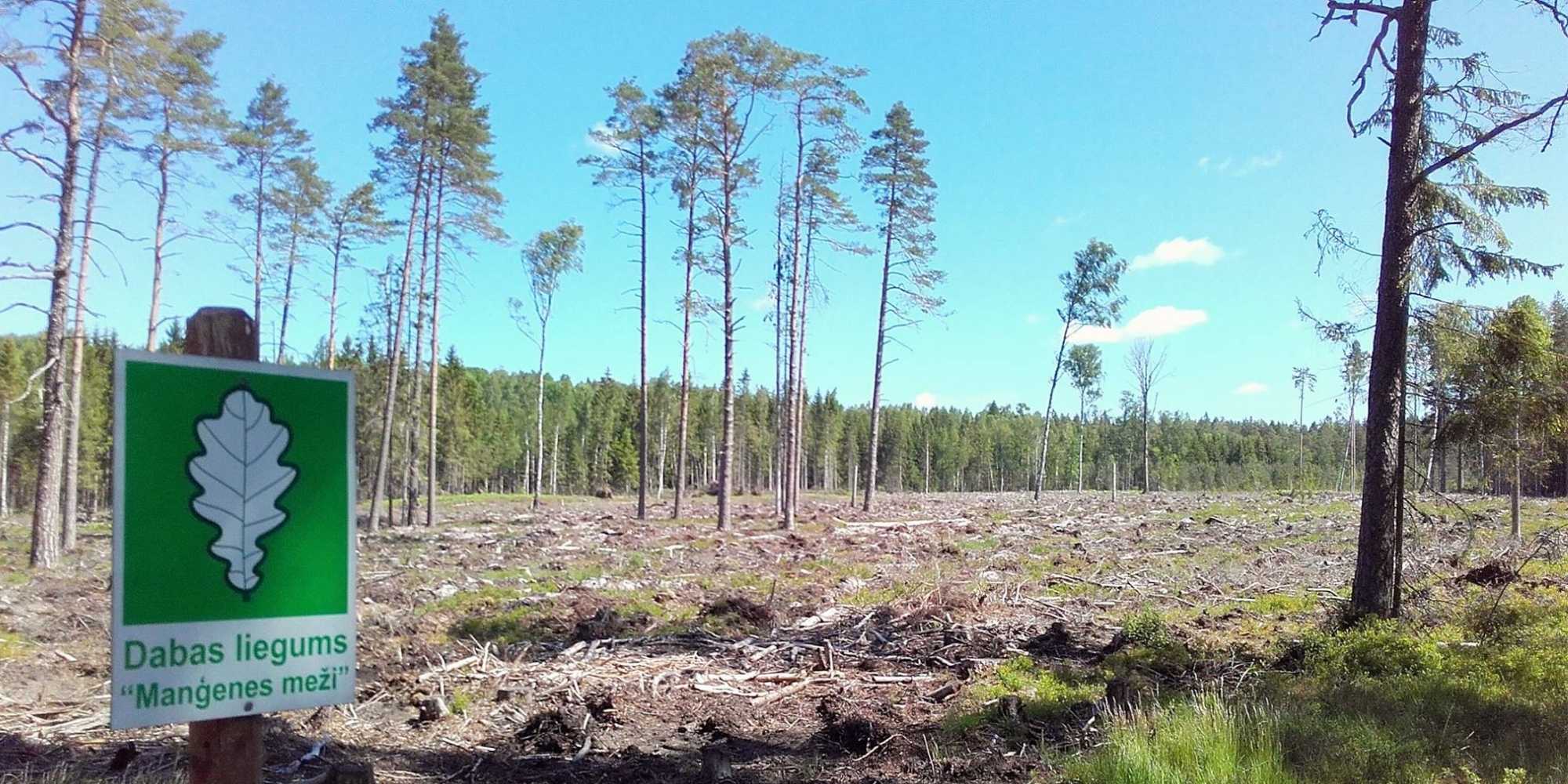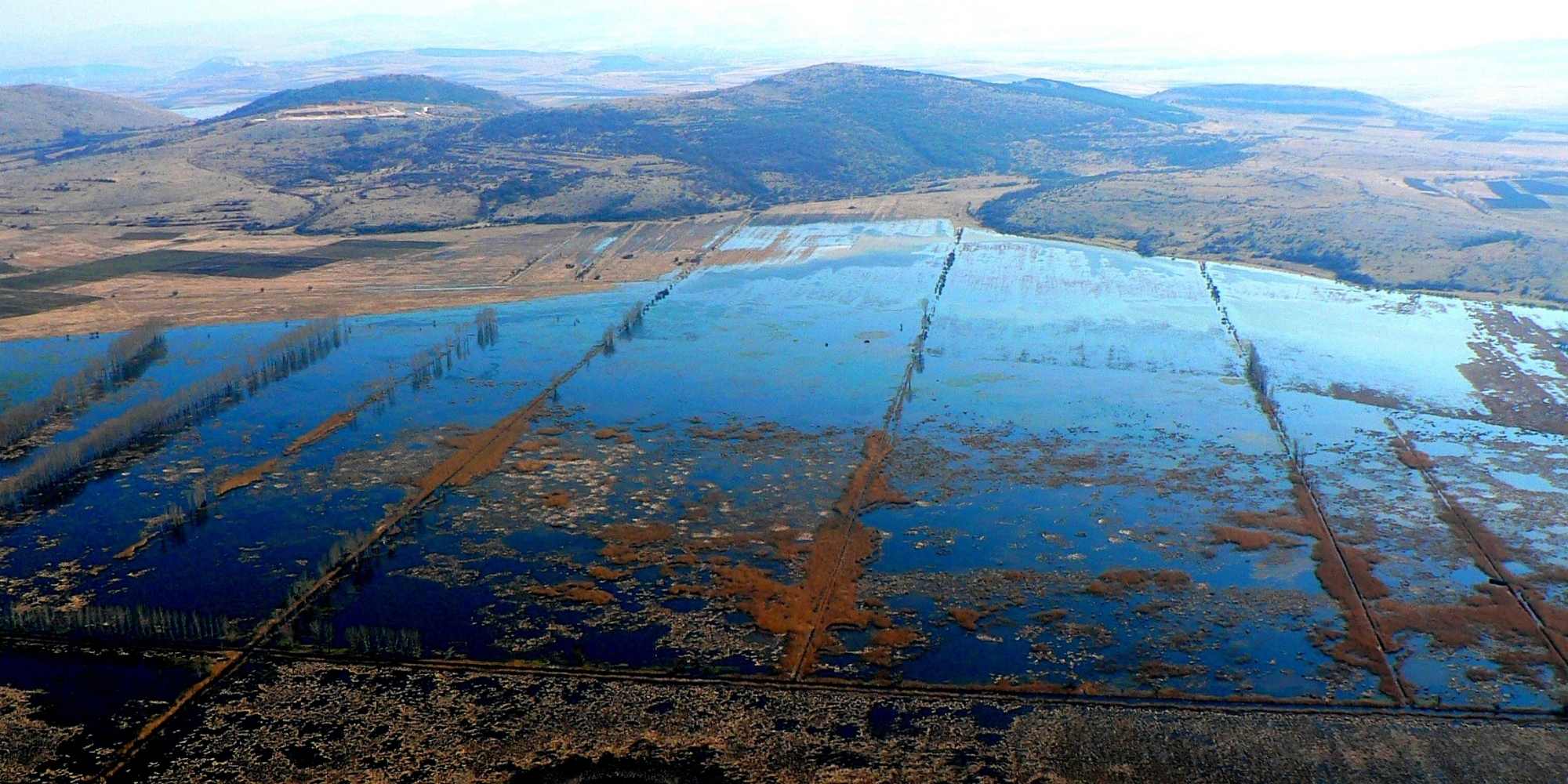A new budget for a new Europe
For nearly three decades, the EU budget, and especially sectoral instruments like the Cohesion Policy, have been a proven catalyst in the fight against climate change and the transition to a low-carbon energy system.
By providing public investments in cleaner transport, energy and construction, which are major sources of greenhouse gas emissions in Europe, the next multiannual financial framework (MFF) can shape our response to the challenges posed by climate change.
To ensure that the budget works for the climate and for the people, it should follow the basic principles: climate should be at the forefront of any spending, aimed at achieving the updated 2030 climate and energy objectives; funds should be disbursed in a transparent manner, and should enable the involvement of local actors and communities.
From Europe’s municipalities to Brussels corridors
With the help of our member groups, our work stretches from local to international level.
Just Transition
Working on just transition brings all actors who believe in fair regional redevelopment to the same table: unions, industry, public administration, governments, civil society and others sharing this goal.
EU’s recovery fund
The EU has put forward a very ambitious investment strategy to support the EU green deal. In addition to the €322 Bn expected from the 30% climate mainstreaming objective in the Multiannual Financial Framework, the EU also agreed on a €750 Bn stimulus package to respond to the pandemic. The extraordinary funds now available to Member States through this “NextGenerationEU” mean that the investment decisions made today will have profound and far reaching consequences for decades to come. Now is therefore a crucial time for ensuring the funds and investments are used to their full potential to really drive the transition and deliver on the EU’s climate objectives.
Once Member States submit their recovery and resilience plans, the focus will turn to the programming of the cohesion funds and programmes. Member States will have to propose Partnership Agreements to the Commission to explain their strategy and investment priorities, as well as presenting a list of Operational Programmes that will outline what will be funded. (see here for a more comprehensive explanation of the EU funds programming process)
Although the new EU budget clearly increases climate and environment ambition, the real challenge will be to ensure that this ambition is properly transposed, implemented and realised as funds start to become available to Member States. In addition to the necessary focus climate, it is also crucial that transparency and monitoring provisions are applied so that the new EU funds create ownership and acceptance from citizens to the energy transformation.
Estonia is waiting till the last moment to share crucial details from its recovery plan
- As of mid-April, Estonia had only published brief documents outlining the proposed measures and budget allocation. Without public scrutiny, the ‘plan’ is missing a strategic vision and goals that would bring the proposed measures together.
- Proposed investments appear to largely support the green transition. Still, important details remain hidden from the public, and many measures could jeopardise the Green Deal by extending the longevity of polluting sectors or harming the environment.
- Noticeably absent are investments in biodiversity protection, despite shortcomings in Estonia’s conservation work and earlier recommendations from the European Commission.
Estonia’s EU recovery fund measures are promising yet potentially obstructive
Blog entry | 20 April, 2021Estonia has good intentions to use the recovery fund to become more resilient while supporting the green transition. However, these intentions are overshadowed by uncertainty and lack of scrutiny, as there is no publicly available strategic framework to bring all of the plan’s measures together, and many measures proposed could in fact undermine the European Green Deal.
Read more
Poland’s recovery plan is not ambitious enough to reach the EU Green Deal targets
- In Poland, stakeholders were not able to see the recovery plan until early March. After pressuring the government to open up the planning process, civil society was able to participate in the public hearings and the implementation of the plan.
- Among the many failures of the Polish plan are measures supporting renewable energy sources, which focus on energy generation from municipal waste instead of onshore wind and solar. The plan’s biggest fault may be its support for fossil gas, which will replace coal.
- The plan overlooks biodiversity protection and includes support for legal solutions that will prioritise construction over the preservation of protected areas.
On the (long) road to recovery: Poland’s plan greenlit
Blog entry | 14 June, 2022Poland’s recovery plan has finally been endorsed by the Commission after over a year of negotiations. Despite multiple declarations from government officials that talks would finish quickly, the plan worth EUR 35 billion was put on hold for an extended period of time because of the Commission’s concerns about the rule of law in the country. Is Poland’s recovery plan a wasted opportunity? Not necessarily, but it is not a fully-used one, either.
Read more
How to win energy sovereignty and avoid a gas trap in Poland
Blog entry | 11 April, 2022Poland’s energy policy has to change urgently in the face of the war in Ukraine. EU funds must finance Poland’s transformation for energy security and sustainability. There is no return to the business as usual when it comes to energy policy.
Read more
Latest unambitious domino falls as Poland publishes plan for EU recovery fund
Blog entry | 25 March, 2021A lack of ambition, vision and delivery sums up the Polish national recovery and resilience plan that was released on 26 February. The fundamental flaw is that the plan provides no path for the country to reach neither the EU’s climate neutrality target by 2050 nor the much less ambitious targets outlined in the recent Poland’s Energy Policy 2040 (PEP2040), like reducing the share of coal in the electricity mix to 56 per cent.
Read more
Slovakia’s recovery plan is mostly climate-friendly, but with dangerous exceptions for gas and highway infrastructure
- Public participation in Slovakia’s recovery planning was mostly a formal exercise – consultation on the draft plan was not transparent or inclusive in line with the partnership principle.
- The plan will direct almost EUR 3 billion for green, climate-friendly investments, but proposed measures will not do enough to help Slovakia reach the necessary targets for decarbonisation and the reduction of greenhouse gas emissions.
- The biggest flaws of the Slovak plan are investments in new highway infrastructure and in gas boilers as a solution to energy poverty.
Devil in the climate details as Slovakia finalises plan for EU recovery fund
Blog entry | 30 March, 2021Thanks to a strong push from the European Commission, Slovakia’s national recovery and resilience plan allocates nearly three billion euros for green, climate-friendly investments. The plan includes commendable aims to renovate buildings, pursue renewable energy sources, clean up dirty industries and develop more sustainable transport infrastructure.
Read more
Romania’s recovery plan misses opportunities for decarbonising electricity production
- In Romania, public consultations on the recovery plan took place, but the final draft didn’t provide any information on how the collected suggestions and proposals were integrated.
- The plan does not specify any milestones, targets or implementation calendars for the proposed investments and reforms. The proposed measures lack a detailed assessment of compliance with the ‘do no significant harm’ principle.
- The decarbonisation of the energy sector is jeopardised by the allocation of a significant amount of funds for fossil fuel investments, specifically the expansion of gas infrastructure and its adaptation for hydrogen.
Fossil gas investments undermine green recovery in Romania
Blog entry | 9 August, 2021Despite strong criticism from the European Commission, the Romanian authorities are determined to use the EU recovery fund for massive investments in fossil gas and hydrogen.
Read more
More of the same secrecy in Latvia and Romania as EU recovery funds planning gets underway
Blog entry | 10 March, 2021National Recovery and Resilience Plans have to be submitted to the European Commission by 30 April, 2021. Yet less than two months before the deadline, the latest updates from the Romanian and Latvian recovery plans raise alarm on public participation and on unambitious climate and energy targets.
Read more
Latvia forgets about biodiversity and sets low energy efficiency targets
- The drafting process for Latvia’s recovery and resilience plan has not been transparent and has failed to involve all stakeholders in meaningful consultations.
- Latvia’s recovery and resilience plan contains many green and necessary measures, but lacks strategic vision. The plan’s proposals could do more to implement the reforms needed for the energy efficiency measures to have an impact, and support for renewable energy could be more ambitious.
- The plan includes measures that pose a high risk to biodiversity, such as the irrigation of wetlands, support for commercial forestry and reducing space for protected habitats.
Biodiversity forgotten in the Latvian recovery plan
Blog entry | 8 April, 2021There is less than one month left for Member States to submit their national recovery and resilience plans to the European Commission. Yet, the Latvian plan is still far from fulfilling the Commission’s requirements to allocate at least 37% of proposed measures to achieving climate objectives.
Read more
More of the same secrecy in Latvia and Romania as EU recovery funds planning gets underway
Blog entry | 10 March, 2021National Recovery and Resilience Plans have to be submitted to the European Commission by 30 April, 2021. Yet less than two months before the deadline, the latest updates from the Romanian and Latvian recovery plans raise alarm on public participation and on unambitious climate and energy targets.
Read more
Czechia’s plan has significantly improved thanks to pressure from civil society, but still misses the mark
- The drafting of the Czech recovery plan has largely been behind closed doors. CSOs were not sufficiently involved and the plan was not made publicly available until the end of March. Still, thanks to pressure from civil society, several harmful investments were taken out of the plan.
- The Czech recovery plan has a clear focus on energy efficiency in buildings, transportation and the digitalisation agenda. However, there is almost no focus on more complex environmental questions (e.g. biodiversity, habitats, ecosystems, soil, etc.).
- Despite strong decarbonisation measures, the current version of the recovery plan will not help Czechia reach a zero-carbon economy by 2050, as it is based on outdated strategic documents and does not propose any significant improvements.
Czech recovery plan a few steps away from being on the right path
Blog entry | 19 April, 2021Thanks to pressure from civil society, several harmful investments in highways and gas infrastructure were taken out of the Czech recovery plan, pushing it towards more of a green recovery. Still, an almost complete lack of allocations for biodiversity and several questionable climate measures set the plan back.
Read more
Hungary’s recovery plan is based on outdated targets and threatens to lock in fossil fuels and nuclear
- Hungary’s plan does not make a clear commitment to a fossil fuel phase-out. Although it aims to enable decarbonisation through the widespread use of renewables and electricity, some measures in sectors like energy and transport will indirectly increase emissions.
- The preparation of the plan lacked a clear, publicly-available timeline for public consultation.
- Only 0.1 per cent of the budget is planned for measures focused on biodiversity, and some measures (such as a proposed water management project) could be harmful for habitats.
Hungary’s recovery plan – not green, just, or resilient
Blog entry | 2 June, 2021Although the Hungarian recovery and resilience plan has undergone major changes since its first draft, it is still far from ensuring a green and just recovery. Despite MTVSZ / Friends of the Earth Hungary’s proposals, the final version leaves households alone in their efforts to improve energy efficiency and fails to propose easily-achievable biodiversity measures. If small modifications are made during the EU-level approval process, the plan could be improved considerably.
Read more
Bulgaria’s recovery plan leans toward fossil fuels with no vision for energy transformation
- The preparation of Bulgaria’s recovery plan lacked transparency and public dialogue. Organisations and experts who submitted suggestions for improvement to the plan’s measures haven’t received any feedback.
- The plan includes support for fossil fuels and does not present a coherent strategy for energy transformation. Support for natural gas, coal and oil might prevent Bulgaria from achieving a decarbonised economy.
- The plan overlooks biodiversity protection and allocates a considerable amount of funds for the rehabilitation of an irrigation system that could destroy wetlands.
Bulgarian recovery plan improves after six-month impasse
Blog entry | 5 November, 2021After a six-month delay and three revisions, the EUR 6.6 billion Bulgarian national recovery and resilience plan has finally been submitted to the European Commission. Although this delay postpones its implementation, the plan is markedly improved particularly in terms of biodiversity protection, following dialogue between environmental groups and the authorities. The process shows the key role public participation can play in delivering a green recovery.
Read more
Opportunities for biodiversity and environment missed in Bulgarian recovery plan
Blog entry | 15 April, 2021Instead of reforms, the country plans to rehab an irrigation system that can potentially destroy wetlands, and without transparency and public dialogue, the plan cements business-as-usual. With a 30 April deadline for submitting national recovery plans approaching and recent parliamentary elections, the Bulgarian government is failing to propose reforms and measures for biodiversity, sustainable agriculture and low carbon economy. Instead, actions such as rehabilitating state-owned irrigation systems not only contradict national strategies but might damage valuable wetland habitats. A lack of transparency and public dialogue casts a further shadow on the process.
Read more
Biodiversity
In May 2020, EU leaders committed to an ambitious Biodiversity Strategy for 2030, outlining the clear need to act on biodiversity loss and address the failing health of nature.
The EU recovery funds represent a golden opportunity to achieve this by ensuring that Member States increase biodiversity spending, invest in transformative green projects and reforms and set in motion the ecological transformation of our economies
Yet so far, biodiversity is being completely neglected within the EU’s recovery package. Member States and failing to properly incorporate such measures into this crucial funding stream, with almost measures currently proposed in the draft national recovery plans to address biodiversity and nature conservation.
Bankwatch have therefore recently launched our latest campaign to ensure that biodiversity and nature conservation become a key part of the recovery. Working at both the EU and in 6 Member States, we will ensure that EU recovery funds dedicate a sufficient share towards biodiversity spending, as well as ensuring no harmful projects are supported. We will further work to shift the narrative at both EU and national level so that biodiversity and nature conservation issues are placed into the spotlight, so as to establish a longer term approach that sets the necessary pathways leading to 2030 and beyond.
Just Transition
Governments across Europe have started preparing plans for how to spend EU Budget money for the transition of coal regions. In some countries in central and eastern Europe, however, the ideas and needs of workers and locals in the regions themselves are not sufficiently taken into account. Bankwatch is actively working on supporting the inhabitants of those regions to get involved in building their own futures while at the same time putting pressure on national governments to give a priority to those voices.
LATEST UPDATES
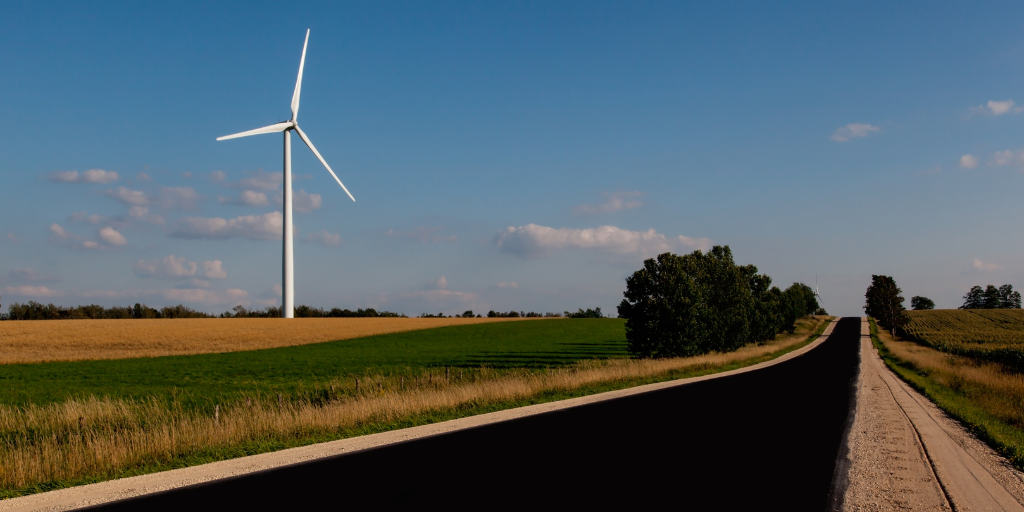
On the (long) road to recovery: Poland’s plan greenlit
Blog entry | 14 June, 2022Poland’s recovery plan has finally been endorsed by the Commission after over a year of negotiations. Despite multiple declarations from government officials that talks would finish quickly, the plan worth EUR 35 billion was put on hold for an extended period of time because of the Commission’s concerns about the rule of law in the country. Is Poland’s recovery plan a wasted opportunity? Not necessarily, but it is not a fully-used one, either.
Read more
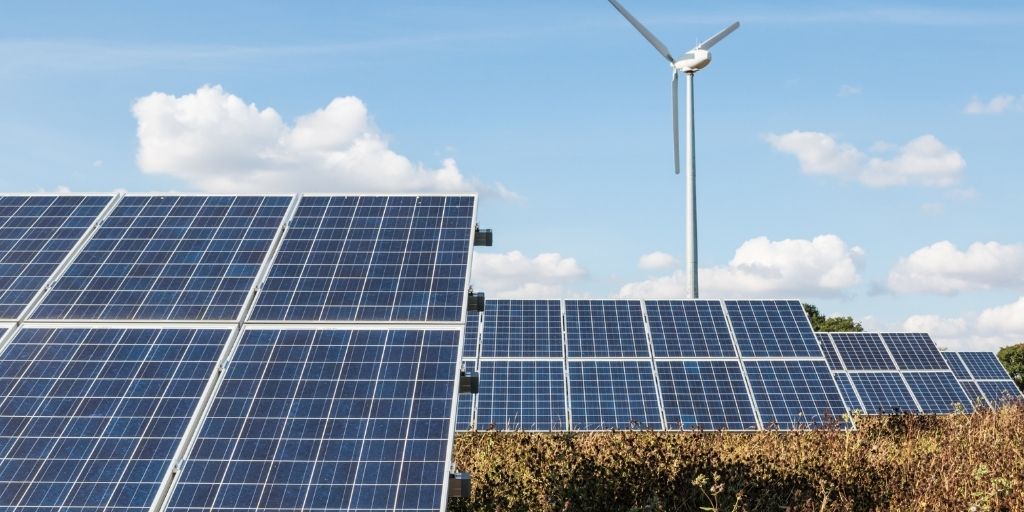
How to win energy sovereignty and avoid a gas trap in Poland
Blog entry | 11 April, 2022Poland’s energy policy has to change urgently in the face of the war in Ukraine. EU funds must finance Poland’s transformation for energy security and sustainability. There is no return to the business as usual when it comes to energy policy.
Read more

Bulgarian recovery plan improves after six-month impasse
Blog entry | 5 November, 2021After a six-month delay and three revisions, the EUR 6.6 billion Bulgarian national recovery and resilience plan has finally been submitted to the European Commission. Although this delay postpones its implementation, the plan is markedly improved particularly in terms of biodiversity protection, following dialogue between environmental groups and the authorities. The process shows the key role public participation can play in delivering a green recovery.
Read more
LATEST PUBLICATIONS
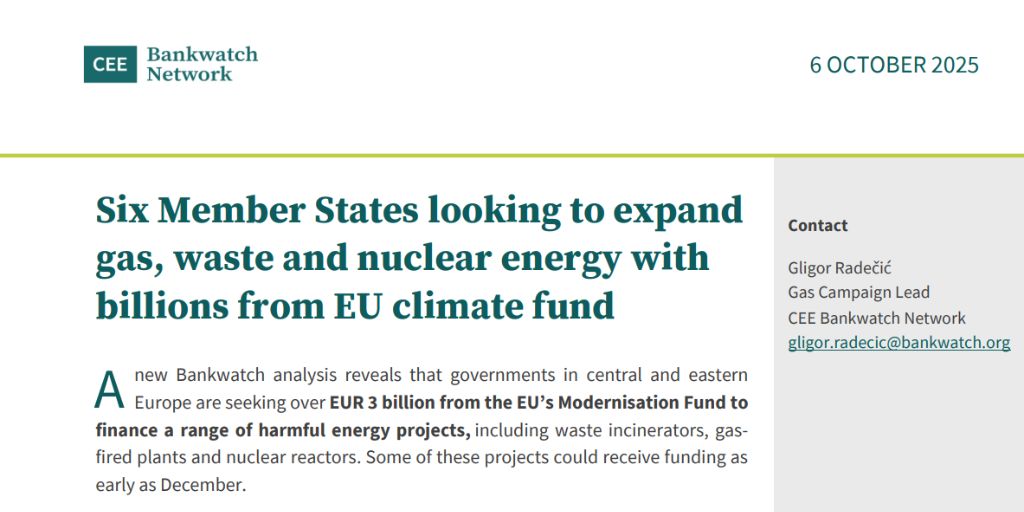
Six Member States looking to expand gas, waste and nuclear energy with billions from EU climate fund
Publication | 6 October, 2025Intended to drive the energy transition in the EU’s lower-income Member States, the Modernisation Fund has been doling out billions to fossil gas and other harmful energy infrastructure.
Read more
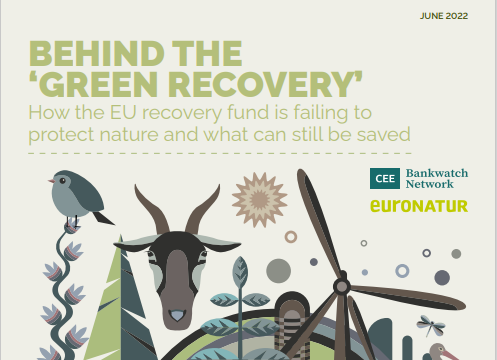
Behind the ‘green recovery’: How the EU recovery fund is failing to protect nature and what can still be saved
Publication | 2 June, 2022This report prepared by CEE Bankwatch Network and EuroNatur, shines a spotlight on the implementation of recovery funds, and reveals a series of harmful reforms and investments for biodiversity set to be financed in nine central and eastern European Member States (Bulgaria, Croatia, the Czech Republic, Estonia, Hungary, Latvia, Poland, Romania and Slovenia).
Read more
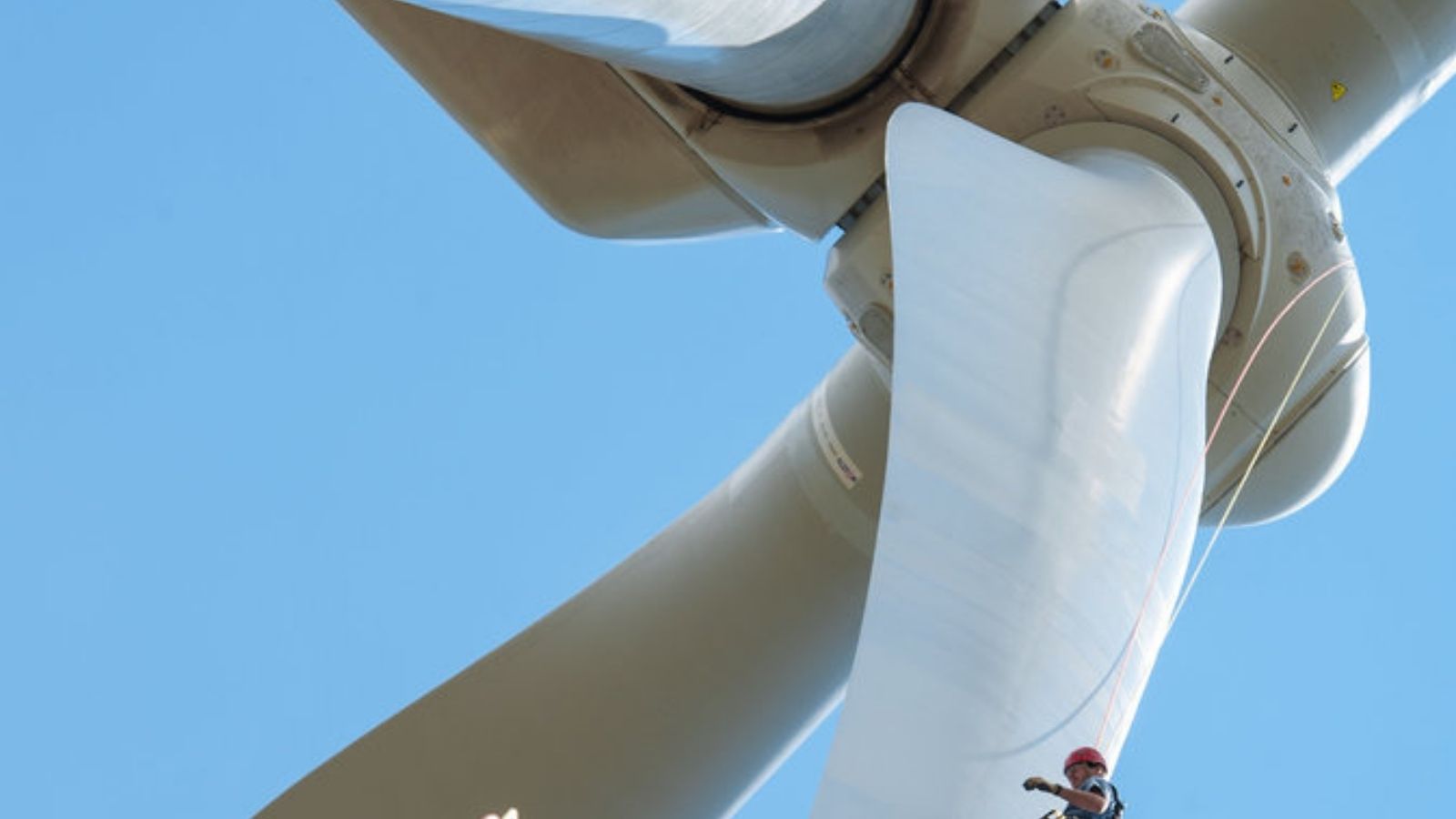
Reaching for a green recovery: what holds back progress in ten EU recovery and resilience plans
Publication | 3 February, 2022The Recovery and Resilience Facility (RRF) is intended to finance reforms and investments in Member States to rebound from the pandemic and pursue a green transition.
Read more
EU POLICY CONSULTATIONS
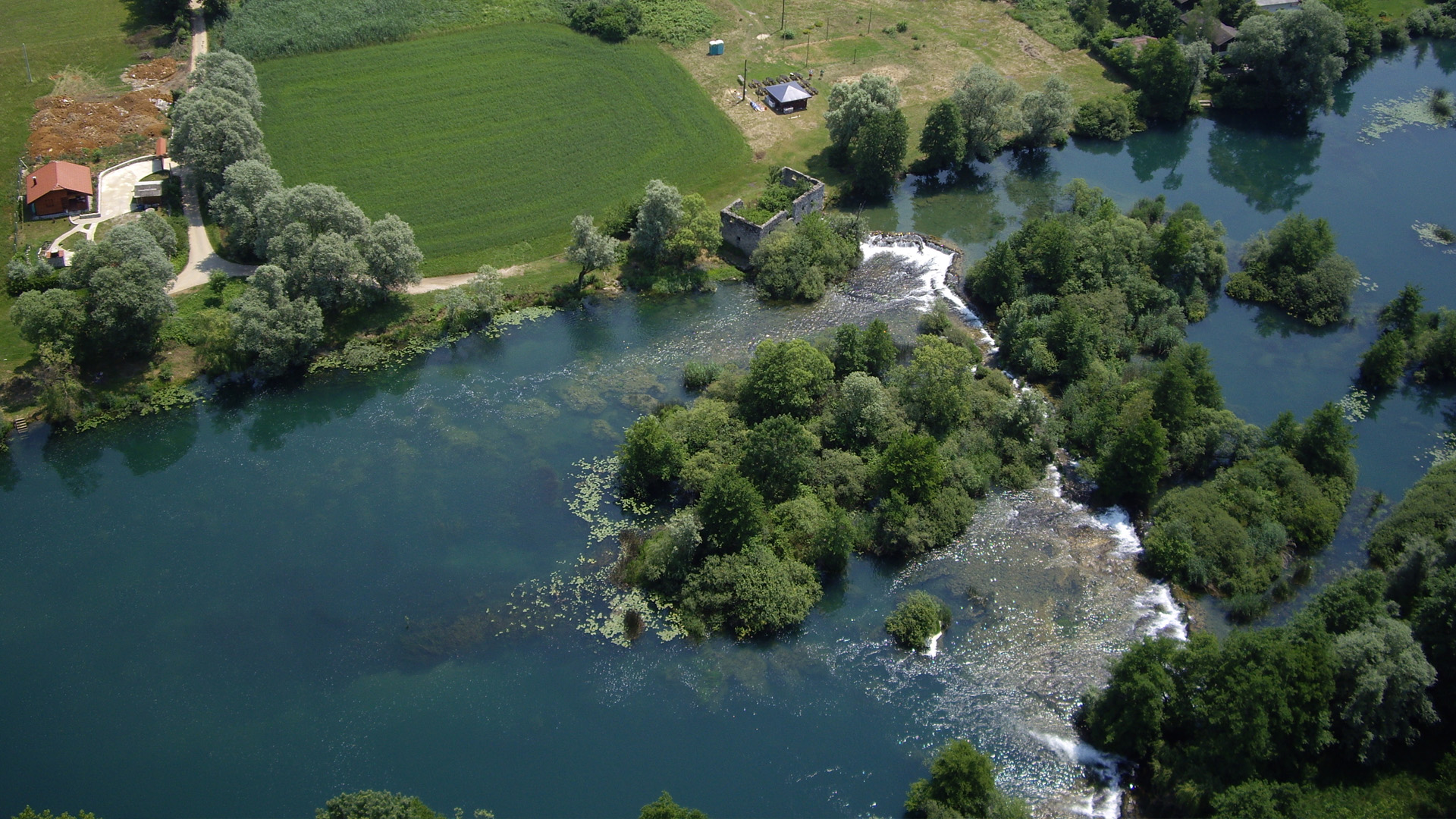
EU state aid rules must finally end environmentally harmful subsidies for energy projects
Blog entry | 12 January, 2021As the European Commission reviews its Guidelines on State Aid for Environmental Protection and Energy, it must finally stop subsidies for activities contradicting EU climate and environment policies.
Read more
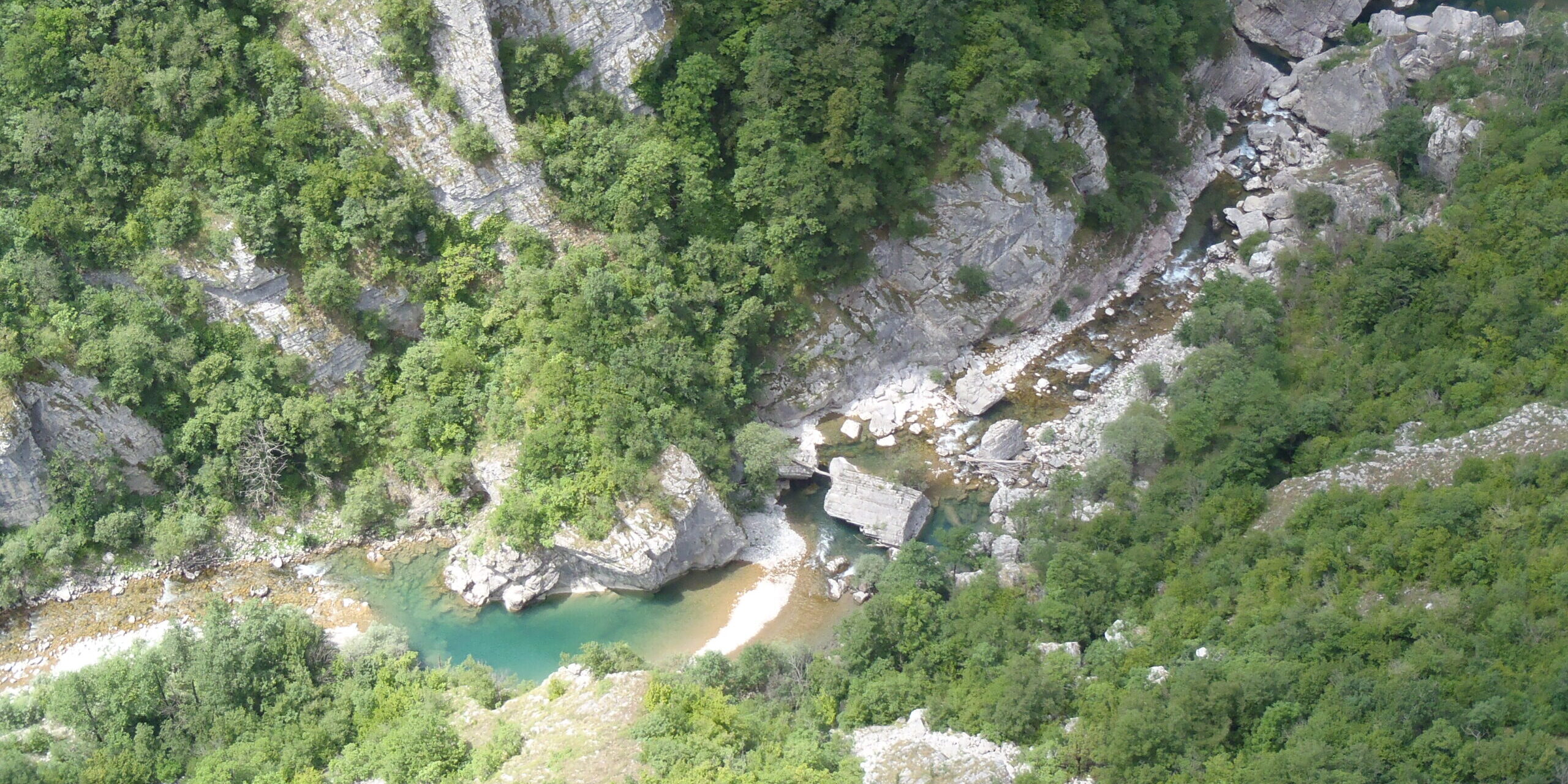
Any increase in renewable energy targets must exclude environmentally destructive projects
Blog entry | 29 September, 2020Raising renewable energy targets alone will not be enough to reduce GHG emissions in a sustainable manner. The Commission must also match this with tighter criteria for hydropower and biomass projects.
Read more
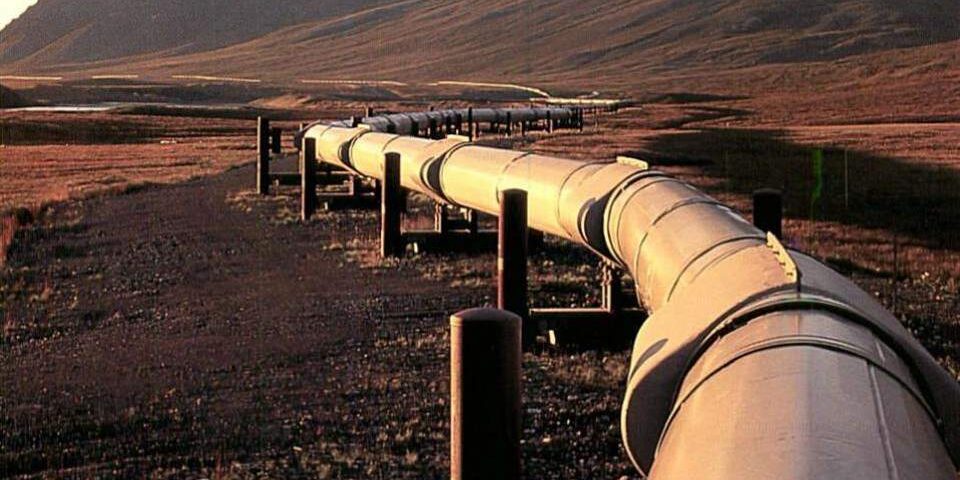
Priority energy infrastructure projects for the EU’s neighbours still anchored in fossil fuels
Blog entry | 28 July, 2020The energy projects proposed by the Energy Community countries for priority status, including privileged access to public funds, have now passed the evaluation stage, expecting a final decision by the year’s end. On the bright side, at least two megalomaniac projects were dropped. On the dark one, the remaining projects floor the gas pedal.
Read more
